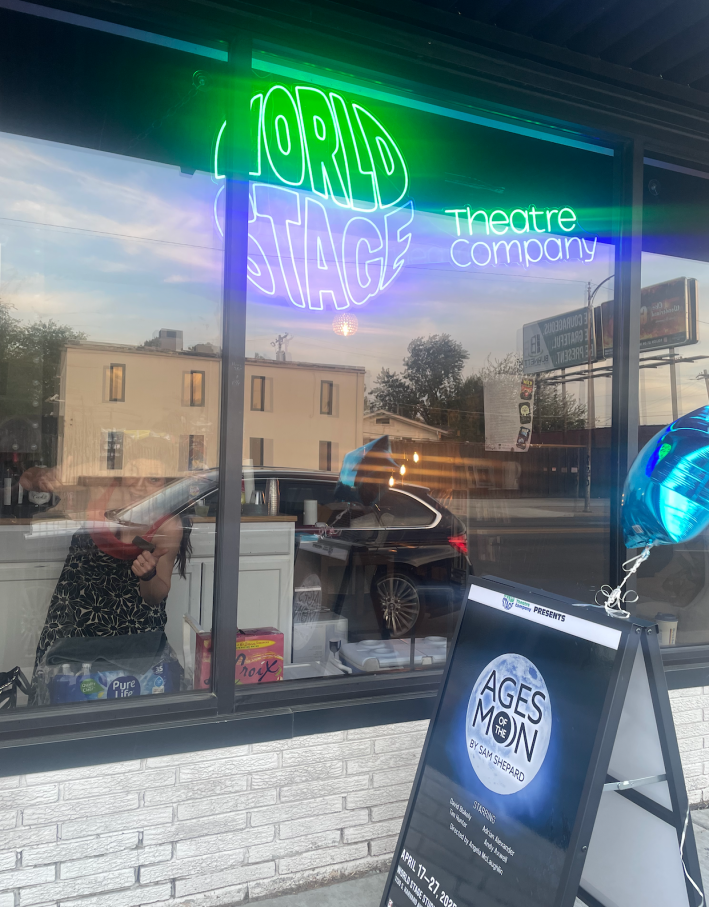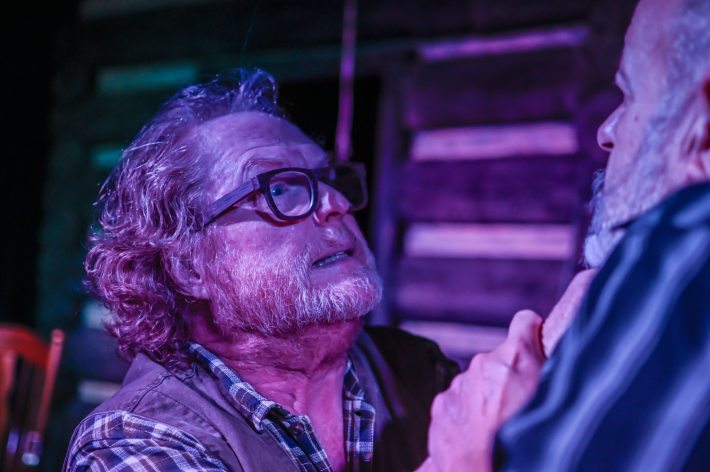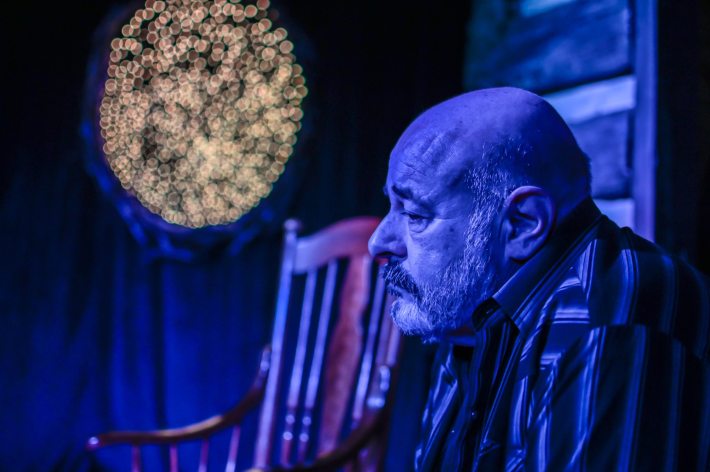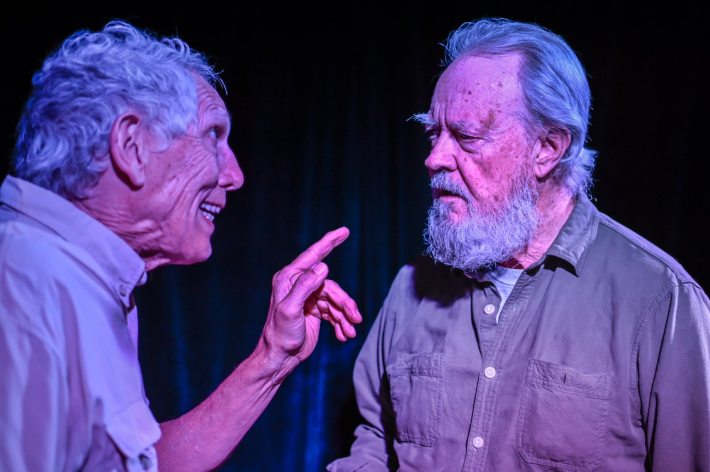World Stage Theatre Company: “Ages of the Moon”
World Stage Studio
April 17 & 18, 2025 (performances run through April 27)
I don’t get men. There are myriad reasons for this; I’m sure you can imagine a few. So, when I saw that World Stage Theatre Company was producing Pulitzer Prize-winning playwright Sam Shepard’s Ages of the Moon—a play about men, starring two men, written by a man whose work often dealt with masculinity—I wrote it in my calendar in pen. I wanted to learn something.
And, because the play was double-cast, with two pairs of actors doing alternating performances, I decided to see it twice.
Seeing a show at World Stage’s storefront theatre at 11th and Harvard is like seeing a show at your grandmother’s house during a family reunion. The front room is filled with eclectic furnishings where attendees, the technical crew and World Stage board members chat and sip drinks while they wait for the show to start. For those who know someone in the theatre community, it’s very Tulsa: every time you decide it’s time to find your seat, someone else you know walks in, or you’re introduced to someone new through a mutual friend. This, of course, prompts further conversation, and the process repeats until you really have to go sit down.

World Stage Studio, photobomb by Angela McLaughlin | photo by Alex Isaak
The playing space is similarly intimate, with seating for about 40 that places the audience right in front of the actors. At Ages of the Moon, pre-show music by Eric Strauss set the tone with the help of a guitar, a banjo and at one point, a haunting saw. Strauss engaged with the audience between each song, and when it was time to start the play, he’d look shyly to director Angela McLaughlin, who’d give him a “you’re good” and he’d shuffle off to the side of the stage. While he packed his things, you could hear the stage manager behind you, calling for the company’s founder to turn off the house lights as McLaughlin waited on the other side of the stage to give her curtain speech.
Anywhere else, this audible backstage business would come across as unprofessional, but here, it aligns with the organization’s mission to demystify the austerity of “the theatre,” with the goal of making all audiences feel like it’s for them. When the cast walks out and the show begins, you forget it happened in the first place, enraptured by the sheer talent on stage. The actors who share the roles in Shepard’s play—Adrian Alexander, Andy Axewell, David Blakely and Timothy Hunter—have a staggering 280 years of acting experience among them, and it shows.
The setup for this two-hander (an industry term for a play for two people) is simple: two older men, Byron and Ames, sit on the front stoop of Ames’ remote cabin in the woods, where he has taken refuge after an explosive argument with his wife. In a distraught fit, he’s called his best friend Byron to his isolated hideaway for emotional aid. With nothing but time and ample amounts of whiskey, the friends chat about women, recall memories that may or may not have happened, and bicker in that way old men do while they watch a 17-hour full lunar eclipse; the hour-long play starts at noon and goes until 5am the next day.
The two casts tell two very different but resonant stories about the realities of aging and male friendship. I had a hard time watching Blakely (Ames) and Hunter (Byron) during Thursday’s opening night performance, partly due to how heavy the material felt in their interpretation. Blakely’s Ames was boisterous and brash, physically and emotionally spiraling out of control, egging on Hunter with abrasive statements, growing increasingly drunk and impulsive as the play went on. His performance felt almost labored, until I caught glimpses of the mask falling; suddenly Blakely would become still and quiet, a lonely man who was hurting and lost. Toward the end of the play, when Hunter as Byron yelled, "You need help, Ames!” I was mentally yelling it with him.

David Blakely as Ames | photo by C. Andrew Nichols
Hunter balanced this by meandering around tense conversations and accusations with deep care. His Byron is sensitive, finding ways to meet Blakely’s Ames where he’s at while holding his own pain close to the chest. A giving performer, he took a more subtle approach than—and at times was overwhelmed by—Blakely.
On opening night, as the play reached its midpoint, its energy circled endlessly on the same plane, maybe because the characters, due to their aging memories, were continuously having the same conversations. I felt lost as I tried to grasp the build of the plot. But my frustration about the lack of momentum turned, by the end, into a warm glow of hope. In the play’s final moments, the two men, sitting on the stoop of Ames’s cabin, shared a moment of vulnerability and wholesome intimacy that made me cheer. These men are not perfect, but when they speak earnestly and respond with care, the tension abates.

Timothy Hunter as Byron | photo by C. Andrew Nichols
Alexander (Byron) and Axewell (Ames) have an entirely different take on Shepard’s play. This cast is older, their energy buoyant but contained. Axewell’s Ames is mischievous and even devious at times as he tries to goad and vex Byron. At one point, he gives a cheeky side eye while telling a tall tale, checking to see if his friend, whose memory is going, picks up on the trick. He gets his just desserts later in the play, when he can’t remember details of a story he told earlier in the evening. Instead of feeling jilted, Alexander’s Byron finds his friend endearing, giving an amused smile or gentle chuckle whenever Axewell says something off the wall. He’s happy to just be with Ames.
But as we learn later, in moments when Alexander is left alone, just being with Ames serves as a distraction from some demons. Axewell’s performance indicates that his Ames might feel the same way. At one point, when Byron threatens to leave, Axewell softens and pleads gently for him to stay in a tone that made the audience go “awww.” They are each other’s light in the darkness; in this rendition, we get more of the former than of the dark realities Shepard’s script also explores.
Alexander and Axewell are a synchronous storytelling unit, so locked in on each other that you feel as though, like Byron and Ames, they really have been friends for 50 years. They volley and layer comments and responses with ease, making Shepard's language, humor, and pacing sing. On Saturday night they were so in sync that, at one point, they turned toward each other and nodded in unison. Their ending moment on the cabin porch comes through as a celebration of their bond, all that came before, and the moments they have left.

Andy Axewell as Ames and Adrian Alexander as Byron | photo by C. Andrew Nichols
I commend McLaughlin for fostering an environment where these skilled actors could develop their own vastly different interpretations of the play. It’s hard to stay on top of one play. But to essentially be on top of two—and, with them, all the little differences in blocking, pacing, prop work, even the type of tree stump in the set—is impressive. It’s clear she supported her casts beyond artistic direction, making adjustments to fight choreography and movement to accommodate the actors’ ages and physical abilities. She even made sure there was soft turf on the floor in areas where the actors drop to the ground. Her care for the craft and the people involved makes this piece—which is so deeply about care—all the richer.
The crew for Ages of the Moon has coordinated some of the most effective technical feats I’ve seen in a while. McLaughlin, lighting designer Anna Puhl and stage manager Susan Fenrich are a powerhouse trio behind the curtain. I don’t want to spoil all the surprises, but I will say that the use of a ceiling fan and the way Puhl represents the passage of time are both stunning. Even though a power surge stuttered that time-passage effect on night two, it still worked. On top of it all, Ann Knode’s encompassing soundscape sucked me right into the moment. In this intimate playing space, I felt like I was sitting on Ames’ front lawn, watching the events unfold.
Each cast offers a different lesson in male friendship—and friendship in general. With Blakely and Hunter, I thought about how we can show care for our closest friends who are difficult to love but need it most. With Alexander and Axewell, I got a reminder to cherish those people who make the rollercoaster of life worth living. I’m not sure I learned anything new about men from this play, but I did take away a universal message: when it comes to what we need in life, we’re not all that different. Which cast you see is up to you—or you can be insane like me and see it twice: World Stage is offering a discount for returning audience members.






